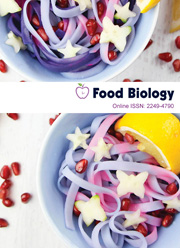Aflatoxins in roasted peanut in Khartoum a hidden and notorious risk to children
DOI:
https://doi.org/10.19071/fbiol.2017.v6.3214Abstract
Aflatoxins are secondary metabolites of about twenty species of the genus Aspergillus. The most important of these species is Aspergillus flavus which was reported for the first time and referred as responsible for the X – turkey disease in 1960 in Great Britain which later on named aflatoxicosis. These toxins pose a limitless risk to man and his domestics by causing a number of diseases and carcinomas. However, since the production of these toxins is rather inevitable accordingly an interdisciplinary management is the answer for managing them. The management of these toxins includes preharvest and postharvest measures such as good agricultural practices (GAP), check of imports, exports, food and feed stuffs, specifying tolerable and action limits and curing by suitable methods.This experiment aimed at having a rapid check for the total aflatoxins in roasted peanut in samples (five groups and 25 in total) collected from the three main cities of the triangular capital Khartoum (Khartoum proper, Khartoum North and Omdurman).Rapid check of aflatoxins has a lot of merits and edge over the other laboratory methods. Twenty five samples of roasted peanut were checked using Aflacheck® test kids (the method used enabled checking 10 ppb total aflatoxins in test samples). Readings revealed that the contamination percentage was 60% for each of the sample groups collected from the two sites in Khartoum proper and 100% for the sample groups collected from two sites in Khartoum north and Omdurman, separately. Statistical analysis showed a significant difference in contamination (at 5% confidence level) between the results from Khartoum proper from one side and the samples collected from Khartoum North and Omdurman areas in the other side. However, the overall contamination percentage was 84%.These results,collectively, are alarming (0 tolerance) fora deadly health risk of this roasted peanut contaminated with aflatoxins to consumers of who the majority are children.Downloads
Download data is not yet available.
Published
22-05-2017
How to Cite
Kabbashi, E. B. M., M. A. Elnour, and S. H. Ahmed. “Aflatoxins in Roasted Peanut in Khartoum a Hidden and Notorious Risk to Children”. Food Biology, vol. 6, May 2017, pp. 7-10, doi:10.19071/fbiol.2017.v6.3214.
Issue
Section
Articles






 .
.